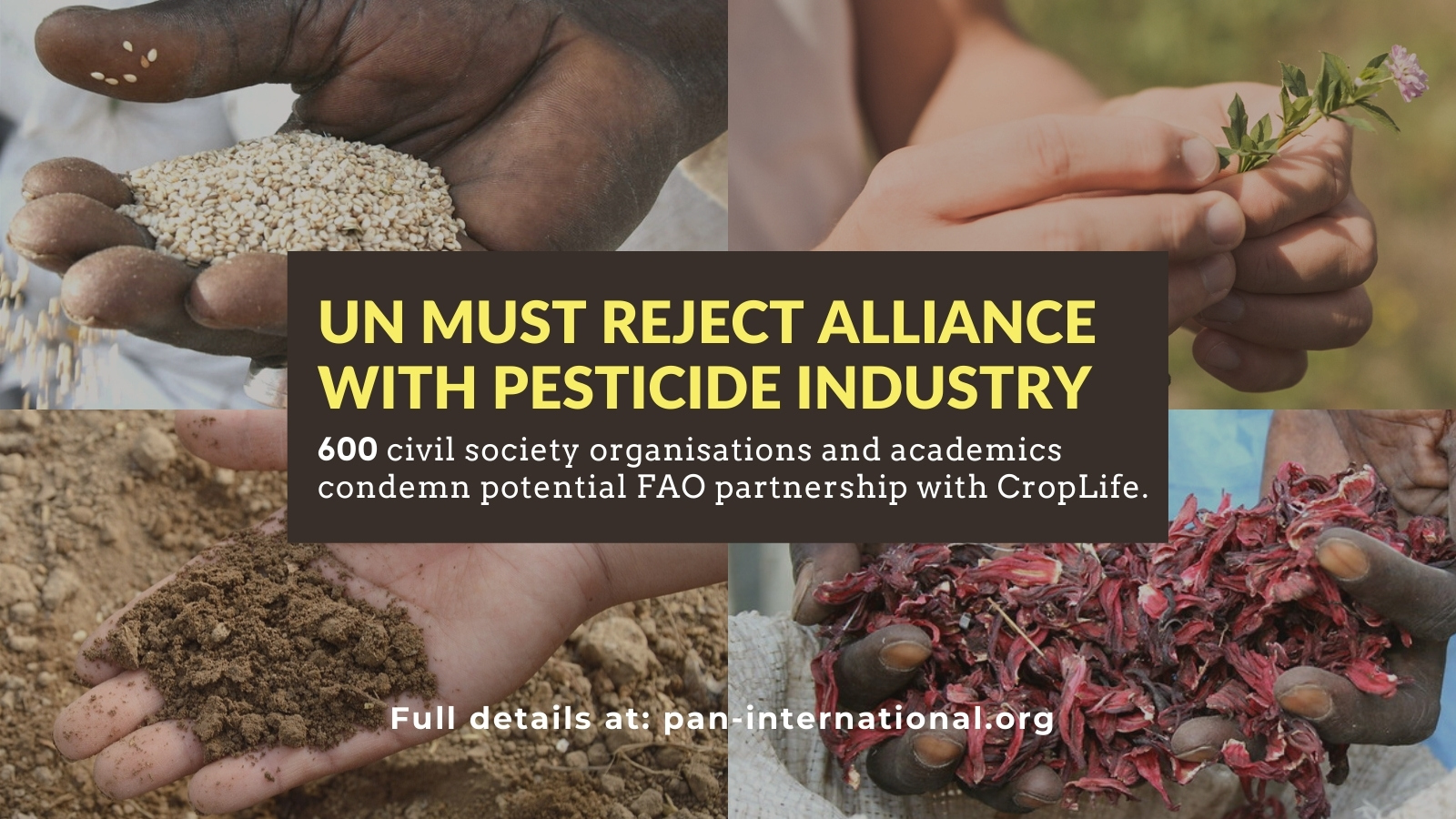Hundreds of civil society and Indigenous Peoples organizations call on the UN agency to renounce planned alliance with CropLife International
Rome – Today 350 organizations in 63 countries representing hundreds of thousands of farmers, fisherfolk, agricultural workers and other communities, as well as human rights, faith-based, environmental and economic justice institutions, delivered a letter to United Nations Food and Agriculture Organization (FAO) Director-General Qu Dongyu urging him to stop recently-announced plans to deepen collaboration with CropLife International by entering into a formal partnership.
CropLife is a global trade association representing the interests of companies that produce and promote pesticides, including highly hazardous pesticides (HHPs). According to the letter, HHPs “are responsible for a wide range of devastating health harms to farmers, agricultural workers and rural families around the world,” and these chemicals have “decimated pollinator populations and are wreaking havoc on biodiversity and fragile ecosystems” as well.
“This proposed alliance is deeply inappropriate and directly undermines FAO’s goals of supporting food systems that are healthy, resilient and productive while safeguarding the sustainability of the environment,” says Sarojeni Rengam, Director of Pesticide Action Network (PAN) Asia Pacific. “CropLife’s purpose, on the other hand, is to advocate for continued use of the pesticides that its members sell. These hazardous and antiquated chemical solutions pose deadly obstacles to the urgently needed transition to innovative, knowledge-intensive ecological approaches to farming.”
Ms. Rengam delivered the letter today on behalf of PAN International, ten other co-sponsoring organizations and networks, and hundreds of signatories.
The letter highlights a recent analysis of industry records that documents that CropLife member companies BASF, Bayer Crop Science, Corteva Agriscience, FMC and Syngenta make more than one-third of their sales income from highly hazardous pesticides (HHPs) — the pesticides that are most harmful to human health and the environment. The proportion of HHP sales is even higher in developing countries, the letter says, where safety regulations are often less robust and harms to human health and the environment are greater.
“So many of our Yaqui children have died and suffered lifelong disabilities from exposure to toxic pesticides that were banned by the countries that exported them to be used in our territories,” said Mariano Ochoa Millan, former Board member for the International Indian Treaty Council from Rio Yaqui Sonora, Mexico. Millan, who passed away from COVID-19 on August 31, made this statement in response to the July 9, 2020 statement by the UN Special Rapporteur on Toxics calling on wealthy nations to halt the practice of exporting banned pesticides. Many of CropLife’s member companies are strong proponents of this practice.
Today’s letter was co-sponsored by a broad-based group of global networks and international organizations: Alliance for Food Sovereignty in Africa (AFSA), Center for International Environmental Law (CIEL), FIAN International, Friends of the Earth International, Institute for Agriculture and Trade Policy (IATP), International Indian Treaty Council (IITC), International Pollutants Elimination Network (IPEN), International Union of Food, Agricultural, Hotel, Restaurant, Catering, Tobacco and Allied Workers’ Associations (IUF), Pesticide Action Network (PAN) International, Public Eye and Third World Network.
Marcia Ishii, senior scientist at PAN North America, explained the serious implications of the proposed collaboration: “FAO’s decision to initiate a formal partnership with CropLife is bad news for the millions of farmers whose health and livelihoods have been devastated by the highly hazardous pesticides manufactured by CropLife member companies. Unfortunately, since Mr. Qu’s arrival at FAO, the institution appears to be opening up to deeper collaboration with pesticide companies, which are likely to exploit such a relationship for bluewashing, influencing policy development, and enhancing access to global markets. It is no surprise that FAO’s recently appointed Deputy Director General, Beth Bechdol, comes to FAO with a history of close financial ties to Corteva (formerly Dow/DuPont), a Croplife member headquartered in Bechdol’s home state of Indiana, USA.”
“We need a strong FAO, independent of the pesticide industry and free from the market interests of global corporations, committed to safe, healthy food and sustainable farming systems for the benefit of all people,” says Susan Haffmans from PAN Germany. “With its commitment to agroecology, FAO has embarked on this sustainable path. The FAO should not jeopardize its successes in agroecology nor its integrity by cooperating with precisely that branch of industry which is responsible for the production of highly hazardous pesticides and whose products contribute to poisoning people and their environment worldwide.”
An international group of 250 scientists and researchers have also expressed concern about the proposed alliance, delivering a letter to Director-General Qu Dongyu today, urging him not to pursue a formalization of FAO’s collaboration with CropLife.
Here is the Joint letter to the FAO with full list of signatories (also available here as pdf)
Contacts:
Ahna Kruzic, PAN North America, ahna@panna.org, 510 927 5379
Keith Tyrell, PAN United Kingdom, keith@pan-uk.org, 44 75 887 06224
Ilang-Ilang Quijano, PAN Asia Pacific, ilang.quijano@panap.net
Roberto Borrero, International Indian Treaty Council, communications@treatycouncil.org, 917 334 5658








Discussion about this post